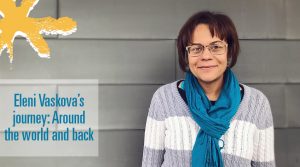
Like many other college students, Eleni Vaskova, a junior in computer engineering at Iowa State University, has a lot on her plate. She balances her life inside and outside of school just like many students do.
But unlike most students in college, Vaskova is 46 years old, a single mom with two daughters, living with constant test anxiety and Post Traumatic Stress Disorder (PTSD) and recently came back to Ames from Europe.
Vaskova grew up in Ames and studied in ISU’s Department of Electrical and Computer Engineering right out of high school. But because of extreme test anxiety, Vaskova could never pass a test.
“It was confusing to everyone because I would do so well on the homework,” Vaskova said. “But when it came time for the test I would fail.”
The test anxiety Vaskova experienced caused her to drop out of college. She moved to Europe shortly after, got married and had two daughters. But the marriage ended in divorce, and now Vaskova and her daughters are back in Ames, where Vaskova’s computer engineering career all started.
Now, Vaskova is ready to be a computer engineering student again. No matter what the world throws at her this time, she’s here for the long run.
“I am a lot more focused now than I was years ago. I was motivated then, but this time I won’t walk away,” Vaskova said.
Vaskova said the one thing keeping her at ISU is something she never did when she was younger — asking for help.
“It’s been reaching out for help that has allowed me to be where I am now,” Vaskova said. “Otherwise, I would’ve broken down again like I did the first time.”
Vaskova “reached out” to the student accessibility services at Iowa State and meets with professionals there occasionally. For her anxiety, she has a little more time than normal to complete exams and avoid the stress of finishing tests in time.
Along with the anxiety Vaskova experiences, she also lives with the constant fact that she is not the traditional 18-24 year old college student anymore.
“Imposter syndrome sometimes creeps in, saying, ‘What are you doing here? You don’t belong here,’” Vaskova said.
Vaskova experiences this feeling outside of campus as well, but for a different reason. When she tells people about her major in computer engineering, some of them seem to believe she is in the wrong field.
“People will ask me, ‘Why are you doing computer engineering? Why not public relations?’ Well, because that’s what I want to do, because I’m a mother and because I want to help. That’s why,” Vaskova said.
Although Vaskova experiences a lot of judgment being a student and a single mom as well as a non-traditional age, she still has huge goals and dreams with computer engineering. But Vaskova’s overall goal is simply to help people.
“People don’t realize how much computer engineering helps people, and that’s what we are ultimately trying to do. We are trying to help people,” Vaskova said.
Vaskova is particularly interested in autism and brain abnormalities and hopes to use computer engineering to help people cope with abnormalities in their brain. Working with the ISU Brain Initiative and studying circuits in the brain is her most reachable goal, as of now.
Schoolwise, Vaskova’s goal is to have enough education to be a postdoc, at least for now. This way, she can be a part of the ISU Brain Initiative and learn about things like magnetic stimulation and neurons in the brain.
Diane Rover, professor in electrical and computer engineering, has played a large role in influencing Vaskova’s career. In fact, Vaskova was originally interested in computer science but Rover led her to computer engineering.
“Dr. Rover has been so supportive and instrumental in my academic and personal progression,” Vaskova said.
Vaskova is currently working toward her goal as a postdoc by studying whenever she has time. She says she works on her homework at home in the living room, allowing her to spend time with her kids and do homework all at once.
Vaskova isn’t stepping down this time. She says that with campus resources, motivation and focus, she will someday earn a position as a postdoc and help other engineers and scientists study the brain.
“Being a single mother at 46 with two kids and majoring in computer engineering is hard,” Vaskova said. “But computer engineering is what I love to do. This is my future.”